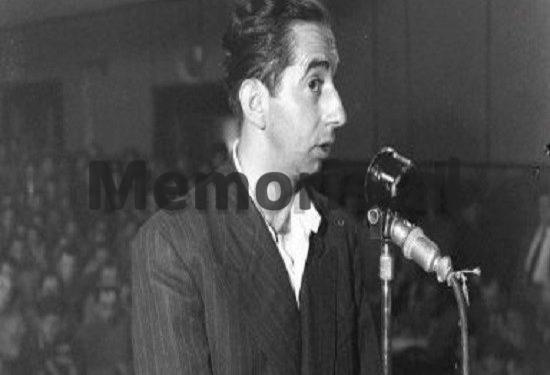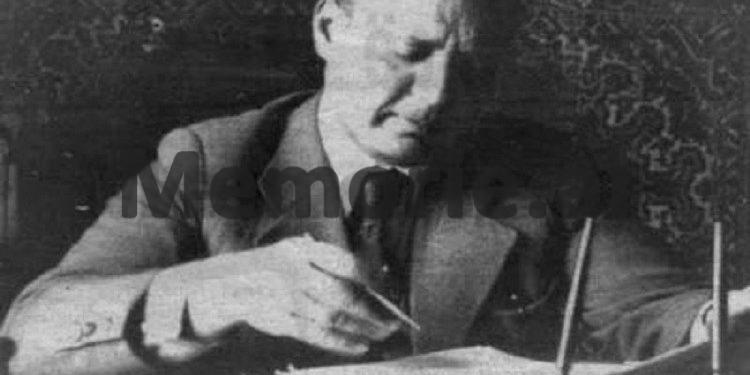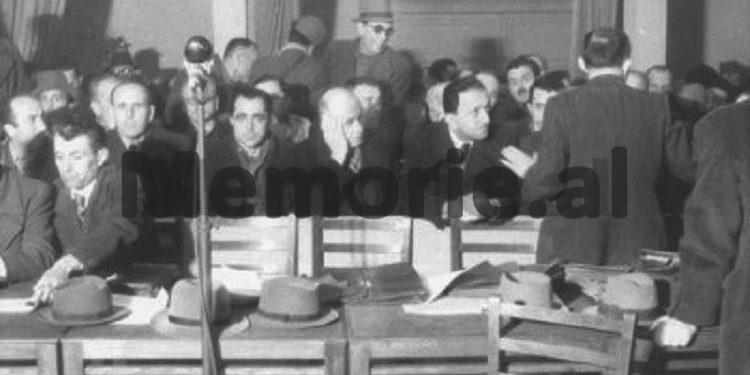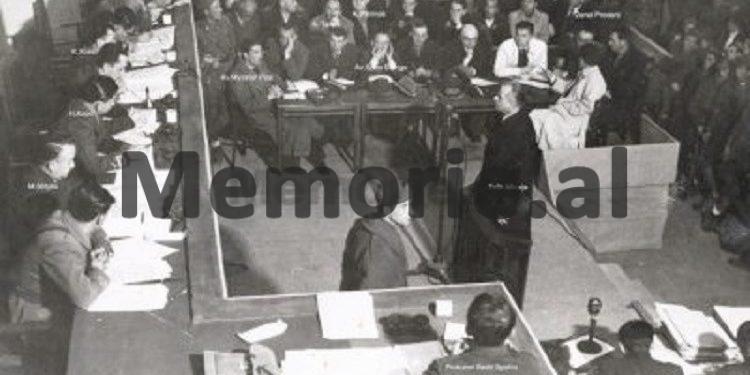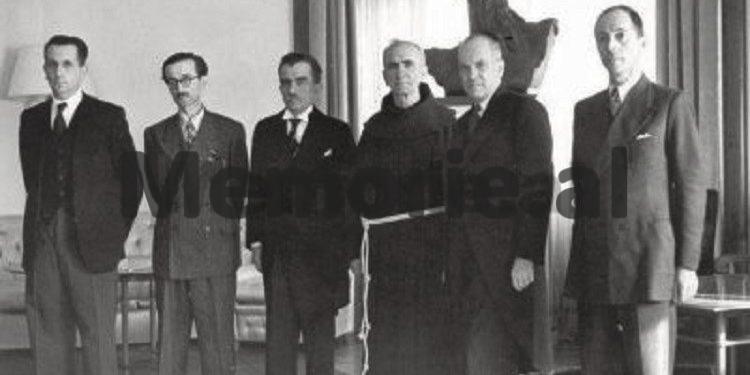Dashnor Kaloçi
Memorie.al publishes the unknown story of Sokrat Dodbiba, a well-known intellectual from the city of Elbasan who graduated in Austria, who during the German occupation of the country, served as Minister of Finance in several cabinets of the governments of that time. Memoirs of his lawyer, Dr. Spiro Stringa and the famous defense he made in the Special Court using Mitrush Kuteli’s statement regarding Dodbiba’s opposition to the return to the German forces of the gold they had deposited near the treasury of the Albanian state in Tirana…
In November 1943, Socrates became Minister of Finance and the Germans asked him to give them 30 million Albanian gold francs each month, but Socrates objected and did not give them. Every payment made to the Germans from Nandor in 1943 until July 1944 was made by imposition, so much so that Colonel Richard threatened him with kobure and Socrates during his activity did not give more than 4 -5 million per month versus the 30 million claimed by the Germans. In this policy, Socrates was able to avoid the circulation of the German War brand. “Which would be catastrophic for the country’s economy, devaluing the Albanian franc at all and with the brand that would come into circulation, the Germans would take all the goods that were in Albania as they did in the other countries they occupied.” This is the testimony of the famous lawyer Dr. Spiro Stringa given before the Special Tribunal in March 1945, when he was defending his client Sokrat Dodbiba, who during the German occupation of Albania had held the post of Minister of Finance in the government of that time. Who was Sokrat Dodbiba, what was his past and why did he accept the position of Minister of Finance in the Albanian government of that time? What were the disagreements of the Minister, Dodbiba, with the German authorities in Albania and how could he stop them from taking the gold from the treasury of the Albanian state? What was lawyer Spiro Stringa’s defense of his client, Dodbiba, and how did he escape the shooting?
Why Dodbiba accepted the post of Minister
Regarding the past of Socrates Dodbiba and the reasons why he accepted the post of Minister of Finance during the period of German occupation of Albania, lawyer Spiro Stringa in the Special Court among other things said: “Before entering and analyzing the activity of Socrates Dodbibës, I wanted to stop and make a description of the situation in Albania at the time when Socrates accepted the post of Minister of Finance. When Italy capitulated, hopes for an independent Albania were revived. At that time, after a period of oppression, all honest Albanians demanded to breathe freely and sever all ties with Italy. Like all honest intellectuals and patriots, Socrates Dodbiba asked to do something, but without thinking that at the gates of Albania was standing an enemy even stronger and more dangerous than the first. Driven only by good intentions, imbued with the flame of patriotism, passionate to the core for an Albanian independence, they threw themselves with flesh and soul in participating in state affairs. It was not self-interest, it was the voice of conscience that pushed them not to be apathetic at a critical time, it was good faith, if wrong, that made them act in the highest interests of the Nation, demanding that someone lead them in those moments difficult of his life. It was a self-denial to take on heavy responsibilities at the time, which from the beginning seemed insurmountable and self-absorbed. But someone had to come on stage, even with serious consequences for the responsibility he would take on. Socrates also went out with the others, in the time of fascism he was persecuted by them and fired. Socrates was a high-sensitivity and proletarian type of mind. He worked to win but had not inherited any nobility title. Socrates did not have an exact percession in the work he undertook. He did not judge that his courage was beyond the real power he had in those moments, for the reason that he had set to work with the sole purpose of doing something good. As the son of this country, Socrates hoped to do something not for his personal pride and titles of praise, but only with the noble purpose for the good of Albania. Socrates was accustomed to being honest but did not know that politics was not as it should be and that the job did not suit his loyalty. By the time he accepted that task, everyone was ruled by a psychosis to break the shackles of captivity. They searched without seeing, having their eyes closed. It was the internal chaos created by the overthrow of Impero that pushed anyone who had a position to do something. Likewise, Socrates had no intention of taking office, but accepted that task only out of passion for serving in the interest of the Nation. Socrates knew that he was not a politician and there was no circle against which to carry out any activity, but that he entered that work with conviction only to help the Nation. So, Socrates lacked evil intent. On the occasion of the capitulation of Italy, Albania happened in a very critical situation: o then a government, even if formal, or to accept a general German military occupation. At that time no one took responsibility, because it is called a compromise, with which the Germans had declared that they would not be disturbed in the internal affairs of Albania. I prevail like this thesis: “Let’s save the possible”. This is what lawyer Spiro Stringa said before the Special Court regarding the reasons why his client Sokrat Dodbiba accepted the post of Minister of Finance during the German occupation of Albania.
Stringa: “Why the government should be formed”
After lawyer Stringa argued the reasons why Dodbiba took that government post, he went on to defend himself by arguing about the positive aspects of the Albanian government under German occupation, which included his client Socrates Dodbiba. Regarding this, among others, Dr. Stringa said: “After Dodbiba and the other Cabinet Ministers of the time accepted the post they were assigned, they resigned and at that time an Executive Committee was set up, in which Socrates did not participate. This is also confirmed by the telegram that I have and that is attached to this protection. In that Executive Committee, the protests were beaten and the Independence of Albania was declared. Political prisoners were also released from all prisons and concentration camps, and an Assembly was convened to approve or disapprove the actions of the Executive Committee. In the Assembly, the declaration of Independence was approved, the neutrality of Albania was decided, the High State Council was elected and the Parliament emerged from the Assembly. These actions that took place at that time find the approval of both from the point of view of International Law and from that of Constitutional Law, because the State is the politically regulated society to achieve a common goal and is based on the nature of man, we are always surrounded by urgent needs. The state is not equal to the government, nor can it exist. The anarchist theory that demands the disappearance of the government is unfeasible, since with the disappearance of the government, the concept of the State will be annihilated. Whatever the political form of a country, what international law requires is the existence of a government, since through activity the State becomes visible. The State is a unity, not only conceived and abstract, but external as well as visible, and the State is transformed from an abstract concept into a concrete entity, through its organs, while being used in one of the various functions of the State. So, the necessary need of a government, not only from the point of view of daily needs, but also of the law, is imposed. “One of the actions of the Executive Committee that was created at that time was the abrogation of the Statute of the fascist occupier, and the re-entry into force of the Statute of 1928”, concluded, among others, lawyer Stringa regarding the accusations made against the client of his Dodbiba from the Special Court prosecution, why he had participated in the Albanian government under German occupation.
“Implication on February 4, 1944”
Later, his defense lawyer Spiro Strina focused on the allegations made by the Special Court prosecution against his client Dodbiba, who accused him of having participated and collaborated in the massacre of February 4 and 27, 1944 in Tirana., where the Germans and Xhaferr Deva executed 82 Tirana citizens. Regarding this accusation, among others, lawyer Stringa said: “Socrates is accused of collaborating with terrorists in the massacres of 4 and 27 February 1944. From the outcome of the trial it turns out that these two terrible dates in the life of the Albanian people are not the offspring of the government, but of certain persons: Xhaferr Deva with his companions. It cannot be doubted that the fact is so, because from the depositions of the prosecution witnesses as well as from those of the defense, as well as from the apology of all the defendants, it results convincingly and indisputably, that February 4 and 27 are the offspring of the criminal instinct of the Athenians who smeared their hands with Albanian blood, of the Athenians who, for personal selfishness, to nail down all the State powers, caused the fraternal red blood to be shed in this martyred Tirana. Socrates is known here in Tirana as human and brotherly and not as a “sadist”, because his family education does not allow this, his culture, on the contrary, where he has done good deeds, wiping away the tears of those who suffered. These facts are corroborated by the frequent interventions that Socrates has made to alleviate any suffering, or its disappearance, as evidenced by the evidence we present, where Socrates’ human personality emerges. Socrates is neither of Balli nor of Legality and these facts come to light during the trial, and moreover the defendant Nedim Kokona testified: ‘Socrates and Rrok Kolaj were not strict against the Movement and Socrates opposed the giving of Balli money”.
“Conflict with the Germans over gold”
After numerous arguments that lawyer Stringa put forward in that trial regarding the past of former Minister Dodbiba and the reasons for his participation in the Albanian government of that time, he then focused on his concrete activity during the exercise of his duty as Minister in Finance Department. One of the main arguments he presented regarding Dodbiba’s activity was the efforts he made with the German authorities in Tirana, to stop them from taking the state treasury for the needs they had in Albania. Regarding this, among others, lawyer Stringa said: “Socrates in his activity as Minister of Finance has been against inflation, but despite the circumstances led to an increase after the Germans after robbing 120 million gold (Albanian) francs from the Bank d’Italia, brought them here wanting to keep them themselves. But then they handed over to the government on a condition that whenever they wanted, they would take them after considering them as ‘spoils of war’. In November 1943, Socrates became Minister of Finance and the Germans again demanded 30 million gold francs, for each month, but that Socrates objected. Every payment made to the Germans from November 1943 until July 1944 was made by force, so much so that Colonel Richard was threatened with cobwebs in his hand. Throughout his tenure in that post Socrates did not give more than 4-5 million a month, compared to the 30 million claimed by the Germans. With this policy, Socrates was able to avoid the circulation of the German war mark, which would be catastrophic for the country’s economy, devaluing the Albanian franc completely and with the mark that would come into circulation, they would take all the goods that Albania had. and would send him to Germany as has happened with the other occupied states. Socrates was mentioned during the trial that he had given the organization “TODT” 5 million Albanian francs, but that this fact does not correspond to the truth, since this amount was given by the Executive Committee. It is an indisputable fact that the Germans have brought to Albania about 500-600 thousand napoleons of gold and gold, and such an operation even for a profane person who does not deal with economic issues, convinces that it has been to the benefit of the country. This amount of money has nothing to do with the Albanian Treasury in Rome, which consists of gold bars. So, from this point of view Socrates cannot be responsible for what he is accused of in such terms. During the trial, the accusation mentioned the issue of new banknotes, but that Socrates objected to this, and the Germans without asking him at all wanted to act but that the banknotes were not put into circulation and thus the country did not have any damages. Everything I said above, clearly results from the testimony of the witness God Dr. Dhimitër Pasko, who was shown by us as a witness, could not appear in court because you are in Korça on an official mission, but he was kind enough to issue us a statement which we attach to this defense, and the Court can obtain a visa how Socrates’s entire activity in the Ministry of Finance stands. It is an indisputable fact that a part of the Durrës pier was demolished by the Germans, but that this action was carried out without the knowledge of the Albanian government, a fact that is confirmed by the letter addressed to the Court by the Ministry of Foreign Affairs. Socrates is not a Nazi, in the sense that they are confirmed by the testimony of the witness Koço Lipivani as well as by the statement of Dr. Dhimitër Paskos, whom I believe should not be doubted, not only for their education, but also for the social positions they have today. This is Socrates in the fullest sense of the word, and not as the black man wants to present him as a man who boasts in his chair only for personal interests. Therefore, for the above-mentioned reason, I request that Socrates Dodbiba plead not guilty to all charges and that only that of being a Minister remain, but in the conditions, I developed above and consequently his eventual punishment be proportional to the guilt of being only Minister and finally where punishment was amnestied with the pardon given on November 28, 1944”. This is how the lawyer Dr. ended his defense. Spiro Stringa for Sokrat Dodbiba, the former Minister of Finance during the Nazi occupation of Albania who was sentenced by the Special Court in March 1945 to 20 years in prison for the only fact that he was a cabinet minister under German occupation?! / Memorie.al





